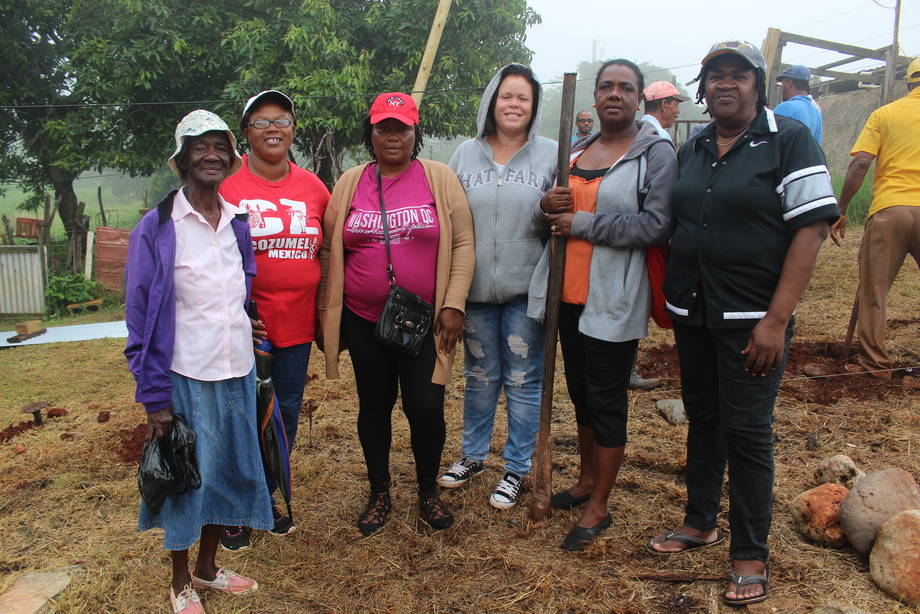
For the female farmers of the Yardley Chase Farmer’s Group the impacts of climate change are a daily reality. Manual crop irrigation is a constant struggle for the farmers who live in a drought stricken area, many of whom cannot afford the costs of setting up irrigation systems. Whilst they have been practicing hand wetting for years, the labour intensive method is pricey for the farmers who must often purchase overpriced water from vendors.
Through FAO’s Technical Cooperation Programme, a project was developed to improve technical and institutional capacities for disaster and climate risk management and sustainable agriculture in Jamaica, Guyana and Suriname. In Jamaica, the FAO project followed earlier interventions for providing training in on-farm water management to three communities in the south-western parish of St Elizabeth. The Yardley Chase Farmer’s Group was selected to join in a participatory process of increasing knowledge, skills and using rainwater harvesting equipment to help in reducing their vulnerability to climate risks.
The project facilitated the set-up of rainwater catchment and drip irrigation systems with the provision of building materials for the construction of 35 shade houses along with 1,000-gallon water tanks. Using the rainwater harvesting system, the farmers are currently growing tomatoes and sweet peppers (the demonstration plot) that will be compared to the same crops being grown on lands using the traditional hand –wetting method (the control plot). The study seeks to test good practices in disaster risk reduction and climate change adaptation and the linkages between building resilience and natural resource management, whilst enhancing the technical capacities of the project participants.
The Farmer’s Group which comprises 35 members is headed by a woman, Mrs Janet Smith, supported by Secretary for the Group, Ms Sherice Dixon. The fifteen female farmers involved in the project that seeks to demonstrate the benefits of good agricultural practices, remarked that they were excited to set up their lands for drip irrigation and to begin using their shade houses. Janet, who was the first to benefit from the establishment of a shade house and tank for the drip irrigation system, noted that the project was very important for the group since rainwater was harvested by most farmers for domestic purposes but not for crop production.
During the dry season the women suffer because they are not always able to purchase drums for storing water to irrigate their farms so they end up producing less crops which affects their incomes. Through the project the women have learnt how the construction of rainwater harvesting systems can increase their income and reduce the time and physical effort involved in traditional methods.
Since the project’s start, the drip irrigation system has proved to be a boon to the women farmers who are now less dependent on purchased trucked water. They have reduced the time and labour in manual crop irrigation and above all, they are now able to produce more crops during dry spells and drought and hope to get better prices for crops produced during the dry season.
Using a community-based approach, farmers supported each other in establishing shade houses and irrigation systems to test specific good agricultural practices. For the ladies of the Farmers Group, the project is the answer to a call for much needed help. The female farmers jointly expressed that they were happy for the project and all the knowledge and tools they were receiving and were very eager to learn how to increase their access to markets and reduce the incidences of glut and spoilage of their crops.
Ms Shanette Burton, one of the farmers using both demonstration and control plots, highlighted that she was “very happy to receive the tank and the shade house which will greatly help her farming and lessen carrying water and the constant bending to water crops”. She added that even after the project ended she would employ the new practices learnt and look for ways to expand on what the project had provided.
The ladies of the Farmer’s group remarked that while they were very grateful for the materials they received, they were more grateful for the knowledge and skills gained in rainwater harvesting and the benefits of using drip irrigation to produce crops. Farmer from the group, Ms Marcia Spencer noted that she would add to her shade house overtime because she also saw it as a useful place for the temporary storage of freshly harvested crops.
Since receiving their shade houses, the farmers have used them for several purposes including the storing of harvested crops, shelter and as a nursery for seedlings.
The knowledge gained from the project demonstrated that there are gender considerations that need to be taken into account when implementing good practices, as many of the women found manual crop irrigation more difficult.
Additionally, while the initial work in establishing the plots proved labour intensive, the female farmers are now excited about using a lower-cost technology and good practices to help them to be more resilient to the impacts of climate change and to improve their livelihoods.
The ladies featured in the Yardley Chase Farmer’s Group are (L-R) Ivilyn Ritchie, Marcia Spencer, Alorna Salmon, Sherice Dixon (Secretary), Shanette Burton, and Janet Smith (President).
